 Blog
Blog 10 Best Survey Software and Tools to Collect Data in 2026
10 Best Survey Software and Tools to Collect Data in 202610 Best Survey Software and Tools to Collect Data in 2026

Data is the new currency!
It’s a foundation for a smarter strategy, customer retention, and growth revenue; all hinged on how well you listen to your target audience.
Surveys are one of the easiest ways to hear directly from your audience. But here’s the challenge: traditional surveys rarely deliver the depth or speed modern businesses need.
With so many platforms available from traditional form-based tools to next-generation AI-driven solutions, the real question isn’t “Should we collect feedback?” but “Which survey software will give us the insights we need to stay ahead?”
That’s why we’ve put together this comprehensive comparison of the best survey software and tools in 2026. In this guide, you’ll see the strengths, weaknesses, and best use cases of each platform so you can make an informed decision on which one to use for your business.
1. TheySaid – No. 1 Choice of Decision-Makers in 2026
If you’re leading a team, a product, or an entire organization, you don’t just need more data; you need decisions backed by intelligence. That’s exactly what TheySaid delivers.
Unlike traditional survey platforms, TheySaid uses AI-powered conversational surveys that feel like real human conversations. Instead of sending your customers a long, tedious form, TheySaid engages them in a natural dialogue, capturing richer insights with higher response rates.
And here’s where decision makers win: TheySaid doesn’t just collect feedback. It automatically summarizes responses, detects trends, and even recommends next steps, turning raw data into executive-ready intelligence.
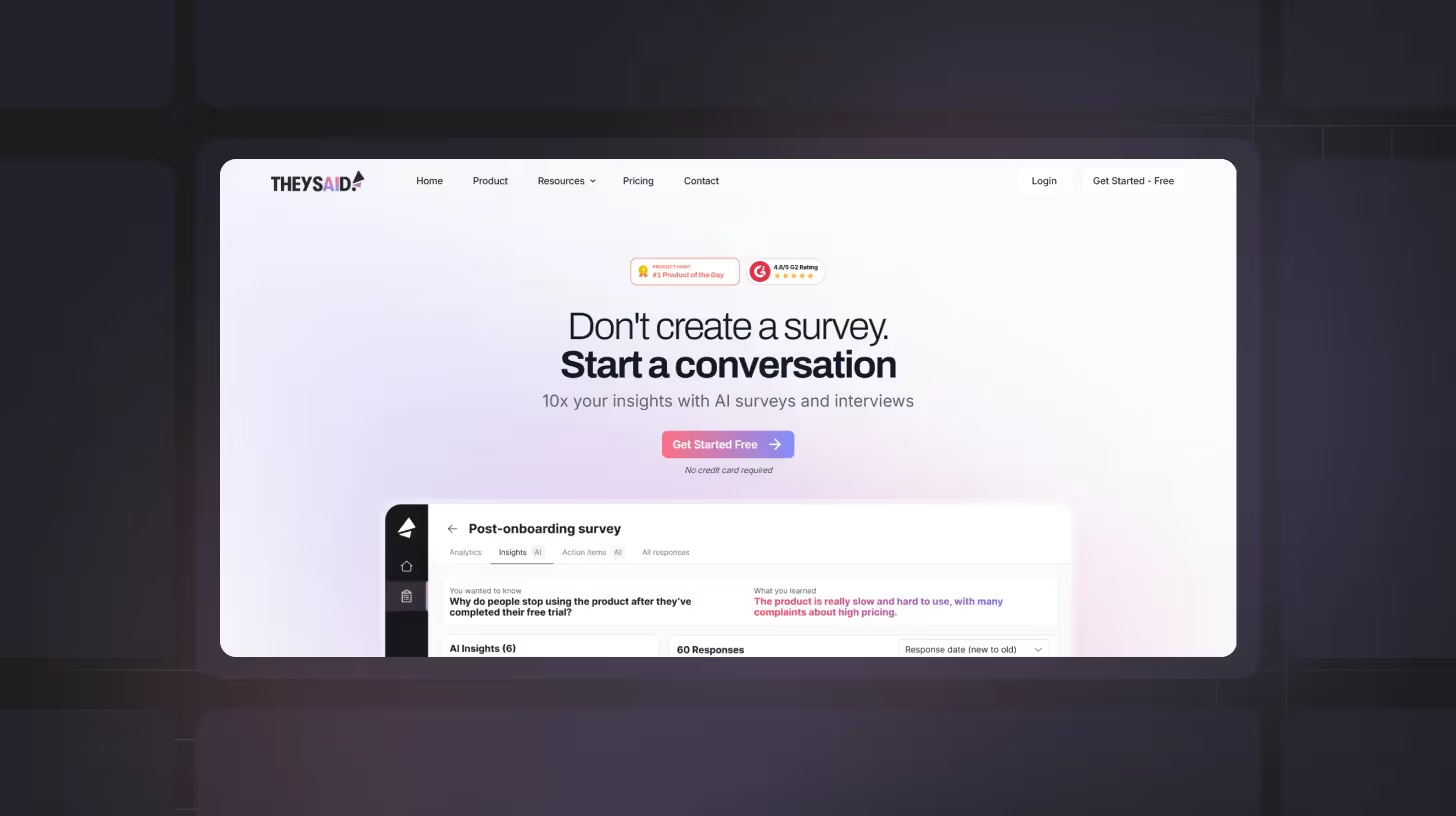
Key Features you’ll like:
- Conversational AI surveys: Questions feel natural, not forced. Respondents often share more than they would in a static form.
- AI interviews: Perfect for win/loss analysis, churn interviews, or customer discovery. TheySaid’s AI handles the entire interview flow.
- Smart summaries: No more digging through raw data. AI generates instant insights, themes, and action points.
- Multi-channel reach: Share surveys anywhere, Slack, LinkedIn, email, QR codes, and meeting people where they already are.
- Higher engagement: Conversations lead to richer answers and fewer drop-offs.
- Logic branching & personalization – Ask the right follow-up questions automatically, based on previous responses.
- Ready-to-use templates – From NPS to churn feedback to employee engagement, launch surveys in minutes.
- Real-time analytics dashboard – Get instant insights with visual reports and AI-driven recommendations.
- Affordable & scalable – Enterprise-grade features without enterprise-level pricing.
Why It’s Different (and Better):
- While others collect raw data, TheySaid delivers decisions.
- While others bombard customers with forms, TheySaid builds trust through conversations.
- While others make you analyze spreadsheets, TheySaid tells you the story behind the data.
Best For:
- SaaS companies looking to understand why deals are won or lost.
- HR teams running employee engagement or 360 reviews.
- Customer success teams reduce churn through real conversations.
- Product managers testing new ideas and gathering feedback quickly.
- Revenue leaders who want customer intelligence that drives upsell and cross-sell opportunities.
- Executives who need boardroom-ready insights without spending hours in spreadsheets.
- Growth-focused teams that want to scale feedback collection without survey fatigue.
What you may not like:
TheySaid isn’t built for long, traditional form-style surveys. But that’s intentional, it’s designed to focus on the quality of insights over the quantity of checkboxes.
2. SurveyMonkey – Classic & Reliable
When it comes to reliability and widespread adoption, SurveyMonkey continues to be one of the most trusted survey software platforms. With years of experience in the market, it has built a strong reputation for offering flexible survey design and straightforward data analysis.
What makes it stand out is its extensive question library, intelligent survey logic, and customizable templates, making it easy to create surveys for everything from quick polls to in-depth research projects.
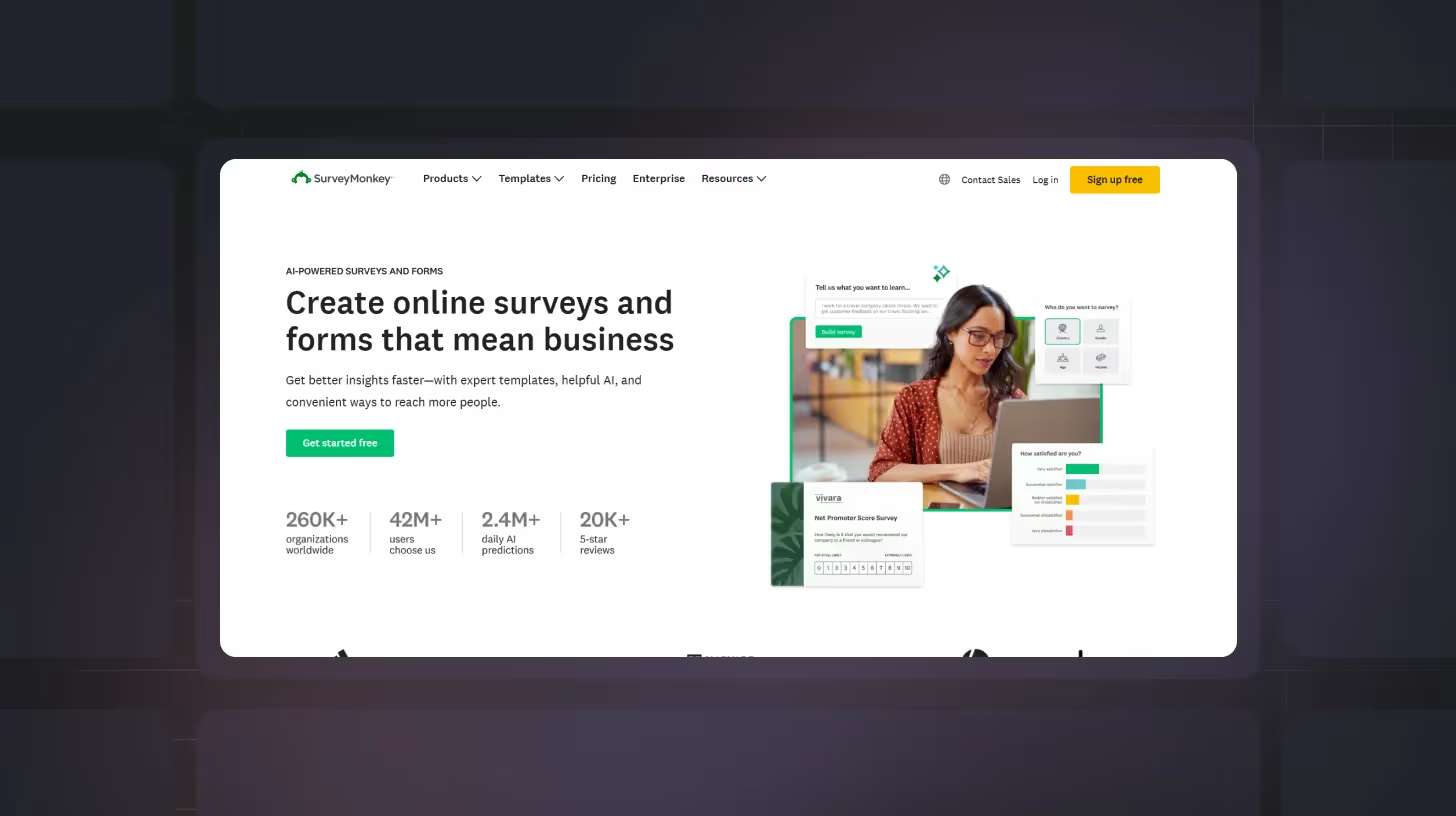
Key Features You’ll Like
- Versatile question types: Multiple-choice, rating scales, open-ended, Likert scales, and more.
- Template library: Hundreds of ready-to-use templates for HR, education, customer feedback, and market research.
- Advanced survey logic: Skip logic and branching make surveys more dynamic and personalized.
- Real-time analytics: A user-friendly dashboard gives you instant insights as responses come in.
- Collaboration tools: Share surveys with your team, comment, and co-edit in real time.
- Distribution flexibility: Send surveys via email, embed them on your website, or share directly on social media.
- Exporting options: Download data in PDF, Excel, or CSV for deeper analysis.
Best For
- Teams that run frequent internal or customer surveys
- Organizations looking for multilingual survey capabilities
What You May Not Like
- The mobile app is known to crash occasionally and can be difficult to log into.
- Some advanced question formats aren’t available unless you upgrade to higher pricing tiers.
- Like most traditional survey tools, it can still feel like “just another form,” which leads to survey Fatigue.
Read - Top Employee Satisfaction Survey Software for 2025
3. Typeform – Engaging & Design-First
If you want surveys that are enjoyable, engaging, and visually appealing, Typeform is the platform for you. Typeform excels at multi-channel deployment, allowing you to embed surveys on your website, add them as pop-ups, or share them as standalone links. It is particularly popular among small firms, marketers, and creators who prioritize design and customer experience.
Key Features You’ll Like
- One-question-at-a-time design: Keeps surveys short, simple, and engaging.
- Multi-channel deployment: Integrates smoothly with websites, widgets, pop-ups, and polls.
- No limitations on complexity: Create everything from simple polls to complex market research surveys.
- Integrations: Works seamlessly with HubSpot, Mailchimp, Google Sheets, and Slack.
- Tiered pricing: Options include Free, Basic, Plus, and Business, providing flexibility for small teams or companies.
Best For
- Small businesses and startups that value design and customer experience
- Marketers running lead generation forms, quizzes, or polls
- Creators who want to build fun and interactive surveys without heavy coding
What You May Not Like
- Customer support can be slow or unhelpful.
- Surveys sometimes fail to auto-save progress, which frustrates users.
- Form design flexibility is limited, and customization is strong visually but weaker in structure.
- Pricing gets steep as you scale beyond basic plans.
4. Qualtrics – Best for Enterprise Research
When it comes to large-scale research and an enterprise-level survey platform, Qualtrics is one of the best survey software available. Trusted by Fortune 500 firms, it provides a large network of over 100 survey templates and categories for customer experience, employee engagement, market research, and other purposes.
What distinguishes Qualtrics is its advanced survey logic and adaptability. You can combine questions from several surveys, customize extensively, and construct questionnaires that delve deeply into consumer or employee experiences. It's designed for businesses that need to run complex, data-intensive survey programs with precision.

Key Features You’ll Like
- Advanced real-time analytics: Gain instant insights into customer or employee feedback.
- Extensive template library: 100+ professionally designed templates across industries.
- Flexible survey design: Combine and edit questions from different surveys.
- Enterprise-ready: Scales easily for global research projects.
- Smooth navigation: Intuitive interface for creating sophisticated surveys without endless complexity.
Best For
- Large organizations running enterprise-level research
- Customer experience (CX) and employee experience (EX) programs
- Academic and market researchers who need deep analytics
What You May Not Like
- Qualtrics is one of the most expensive platforms on the market.
- Steep learning curve requires training for teams to fully utilize.
- Overkill for smaller businesses that don’t need enterprise-grade analytics.
5. Google Forms: Best Free Survey Tool
When it comes to simplicity and accessibility, Google Forms is difficult to surpass. It is part of the Google Workspace package and is absolutely free to use. It connects effortlessly with Google Sheets, Drive, and Gmail. This makes it popular among students, educators, organizations, and small businesses searching for a simple way to collect responses.
While it lacks the deep analytics and AI-powered insights of premium systems, Google Forms succeeds at its intended purpose: rapid, straightforward, and cost-free data capture. You can create a form in minutes, share it via a link, and immediately view replies in a spreadsheet for further analysis.
Key Features You’ll Like
- 100% free to use with a Google account
- Google Workspace integration (Sheets, Drive, Gmail, Calendar)
- Easy sharing: Distribute via links, email, or embed on websites
- Basic analytics: Automatic charts and summaries of responses
- Collaboration-ready: Multiple team members can co-edit forms in real time
- Unlimited responses: No cap on how many people can fill out your form
Best For
- Students, teachers, and nonprofits
- Small businesses need a no-cost survey solution
- Teams is already working heavily in Google Workspace
What You May Not Like
- Forms with very limited design customization look plain compared to other tools.
- Basic analytics, you’ll need Google Sheets for deeper analysis.
- Not suitable for enterprise-level or complex surveys.
6. Zoho Survey – Best Budget-Friendly Option
If you're searching for a reliable survey tool for data collection that won't break the bank, Zoho Survey is an excellent option. It is part of the greater Zoho ecosystem (which includes CRM, email, and marketing tools), making it especially useful if you currently use Zoho products. Nonetheless, Zoho Survey stands out as a low-cost option to well-known survey platforms.
What people value most is how much you get for the price. Zoho Survey's free and lower-tier plans contain limitless surveys, customizable templates, and important reporting capabilities, making it suitable for small to medium-sized organizations on a budget.

Key Features You’ll Like
- Affordable pricing: In comparison to other competitors, it offers free and low-cost programs.
- Unlimited surveys: You can create as many as you like, even on the cheapest subscriptions.
- Template library: Includes ready-made options for customer feedback, human resources, and market research.
- Integrates seamlessly with Zoho CRM, Campaigns, and Analytics.
- Custom branding: Keep surveys consistent with your logo and colors.
Best For
- Small and medium businesses looking for a budget-friendly survey solution
- Organizations already using Zoho’s suite of apps
- Teams that need basic but reliable survey features
What You May Not Like
- Design customization feels a bit limited compared to Typeform.
- Reporting and analytics are less advanced than premium platforms like Qualtrics.
- Interface can feel slightly dated.
Read - Customer Satisfaction Survey Software: Up Your Feedback Game
7. Microsoft Forms – Best for Teams Using Microsoft 365
If your team already lives inside Microsoft 365, then Microsoft Forms is a natural choice. It’s built right into the ecosystem, so creating a survey is as simple as opening an app, no extra software or steep learning curve required.
The tool is designed for simplicity and collaboration. You can build forms, quizzes, and surveys in minutes, share them through Teams, Outlook, or links, and instantly see results in Excel for deeper analysis. For businesses, schools, and organizations already running on Microsoft, this seamless integration is where Microsoft Forms really shines.
Key Features You’ll Like
- Microsoft 365 integration: Works smoothly with Teams, Outlook, Excel, and SharePoint.
- Real-time collaboration: Multiple people can co-create and edit surveys together.
- Simple design: Clean, no-frills interface for quick setup.
- Automatic charts & reports: Instant visual summaries of responses.
- Quizzes & polls: Great for education and training, not just feedback surveys.
- Security & compliance: Enterprise-ready security that aligns with Microsoft’s ecosystem.
Best For
- Teams and businesses already using Microsoft 365
- Educators running quizzes and quick polls
- Organizations needing secure, compliance-friendly surveys
What You May Not Like
- Limited question types compared to SurveyMonkey or Typeform.
- Design customization is very minimal.
- Not ideal for advanced research or complex survey logic.
8. Zonka Feedback – AI-Powered Surveys for Accurate, Multi-Channel Data Collection
Zonka Feedback is an AI-powered Customer Feedback & Intelligence Platform designed to help teams create research-ready surveys and collect responses across every channel. It combines an intuitive builder with powerful automation and AI analytics, making it easy to capture high-quality data for customer feedback, product research, employee insights, and more.
What sets it apart is its versatility. You can deploy surveys through email, SMS, WhatsApp, websites, in-product widgets, mobile apps, QR codes, or offline kiosks, ensuring you never miss a moment of feedback. With 20+ question types, multilingual support, and smart survey logic, it adapts smoothly to both simple polls and complex research programs. Its AI engine automatically analyzes open-text responses for sentiment, themes, urgency, and entities, giving teams clear insights without manual effort. A collaborative response inbox, real-time dashboards, and automated workflows help you act on feedback faster while keeping teams aligned. Pricing is available on request.
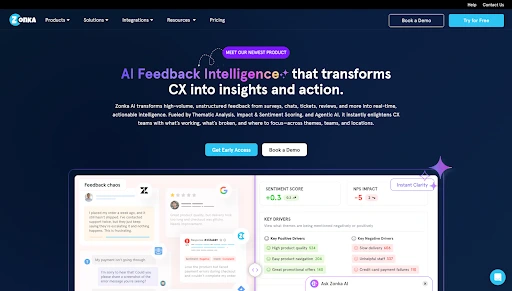
Key Features You’ll Like
- 20+ question types: NPS, CSAT, CES, Likert scales, rankings, image choice, contact fields, and more.
- Easy survey builder: Drag-and-drop creation with templates, branding, variables, and survey logic.
- Multi-channel distribution: Email, SMS, WhatsApp, web widgets, in-app SDK, QR codes, offline kiosk mode, and link sharing.
- Advanced AI analysis: Sentiment, themes, urgency detection, entity insights, and AI summaries that turn raw text into structured insights.
- Real-time dashboards: See trends, CX metrics, location-based results, and agent-level insights instantly.
- Workflow automation: Trigger surveys, send alerts, auto-tag responses, assign tasks, and manage feedback loops.
- Integrations: Salesforce, HubSpot, Zendesk, Intercom, Slack, Microsoft Teams, Google Sheets, Zapier, Make, and more.
- Offline data collection: Collect responses in areas without connectivity and sync them automatically later.
Best For
- Teams that want research-quality data collection across multiple touchpoints
- Organizations that need deep analysis of open-text responses with minimal manual work
What You May Not Like
- Advanced analytics and multi-channel programs may require higher plans.
- Some users may need initial setup time to configure automation and workflows for complex feedback programs.
9. Centiment – Best for Audience Reach
If you need not just a survey tool but also access to the right respondents, Centiment is a standout choice. Unlike most platforms that stop at survey creation, Centiment goes further with its global Audience Panel, making it easy to reach diverse respondents for research projects, marketing studies, or academic work.
Centiment is also highly flexible, you can either use its built-in survey builder or integrate it with other major survey tools you already use. On top of that, its end-to-end research services (from drafting questions to analyzing results) make it ideal for organizations that want a full-service data collection partner.
Key Features You’ll Like
- Global reach: Access a wide audience panel across demographics, geographies, and industries.
- Flexible integrations: Use Centiment’s builder or connect with other survey tools.
- End-to-end support: From survey design to final analysis, Centiment’s research team can assist.
- Custom branding & design: Pre-built themes, custom themes, and video embedding for engaging surveys.
- Smart redirects: Route respondents to specific URLs based on their answers.
Best For
- Businesses and researchers that need targeted audience reach
- Marketing agencies and academics are conducting global studies
- Organizations looking for research services plus software
What You May Not Like
- Pricing is on the higher side, especially for smaller teams.
- The survey builder has some occasional bugs.
- More focused on research use cases than casual, lightweight surveys.
10. SurveySparrow – Best for Conversational UI
SurveySparrow is a tool worth exploring for data collection . Known for its chat-like interface and sleek design, it helps boost response rates by making surveys more engaging and interactive.
Beyond looks, SurveySparrow also brings versatility. You can create classic forms, NPS surveys, employee feedback surveys, or even customer chatbots, all within the same platform. Its multi-channel distribution (email, web, mobile, social media) ensures your surveys reach people wherever they are.
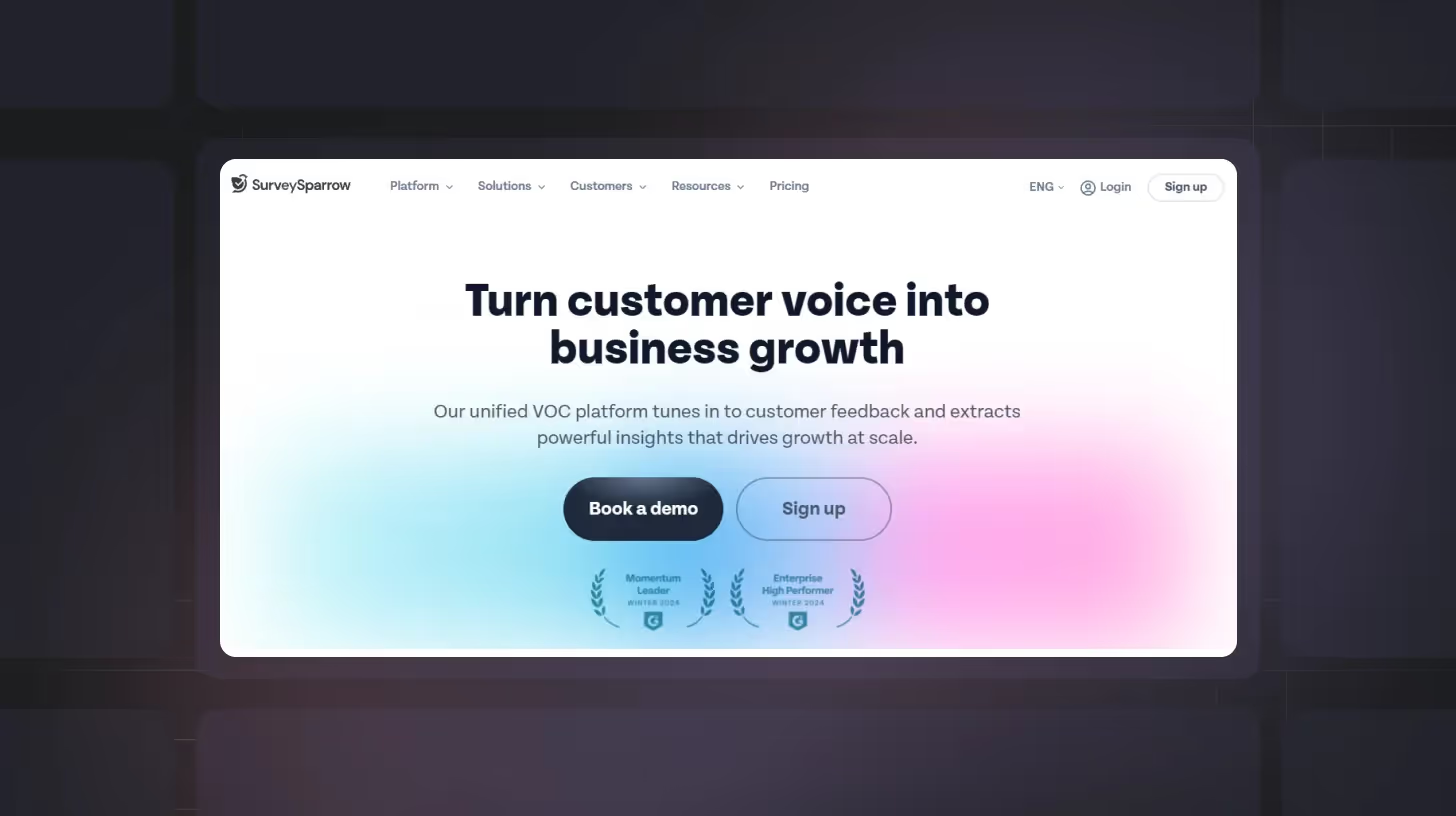
Key Features You’ll Like
- Conversational UI: Chat-like surveys that feel personal and engaging.
- Multi-channel distribution: Share via web, mobile, email, or social media.
- Recurring surveys: Automate employee or customer feedback collection.
- Advanced reporting: Custom dashboards and sentiment analysis for deeper insights.
- White-label branding: Add your own logos, colors, and custom domains.
- Integrations: Works with Slack, HubSpot, Intercom, and more.
Best For
- Businesses aiming to increase survey engagement rates
- HR teams collecting employee feedback or pulse surveys
- Customer experience teams who want surveys that feel personal and interactive
What You May Not Like
- The free plan is quite limited in features.
- Analytics, while solid, aren’t as advanced as TheySaid.
- Some users find pricing a bit steep compared to alternatives.
Feature-by-Feature Comparison of the Best Survey Software (2026)
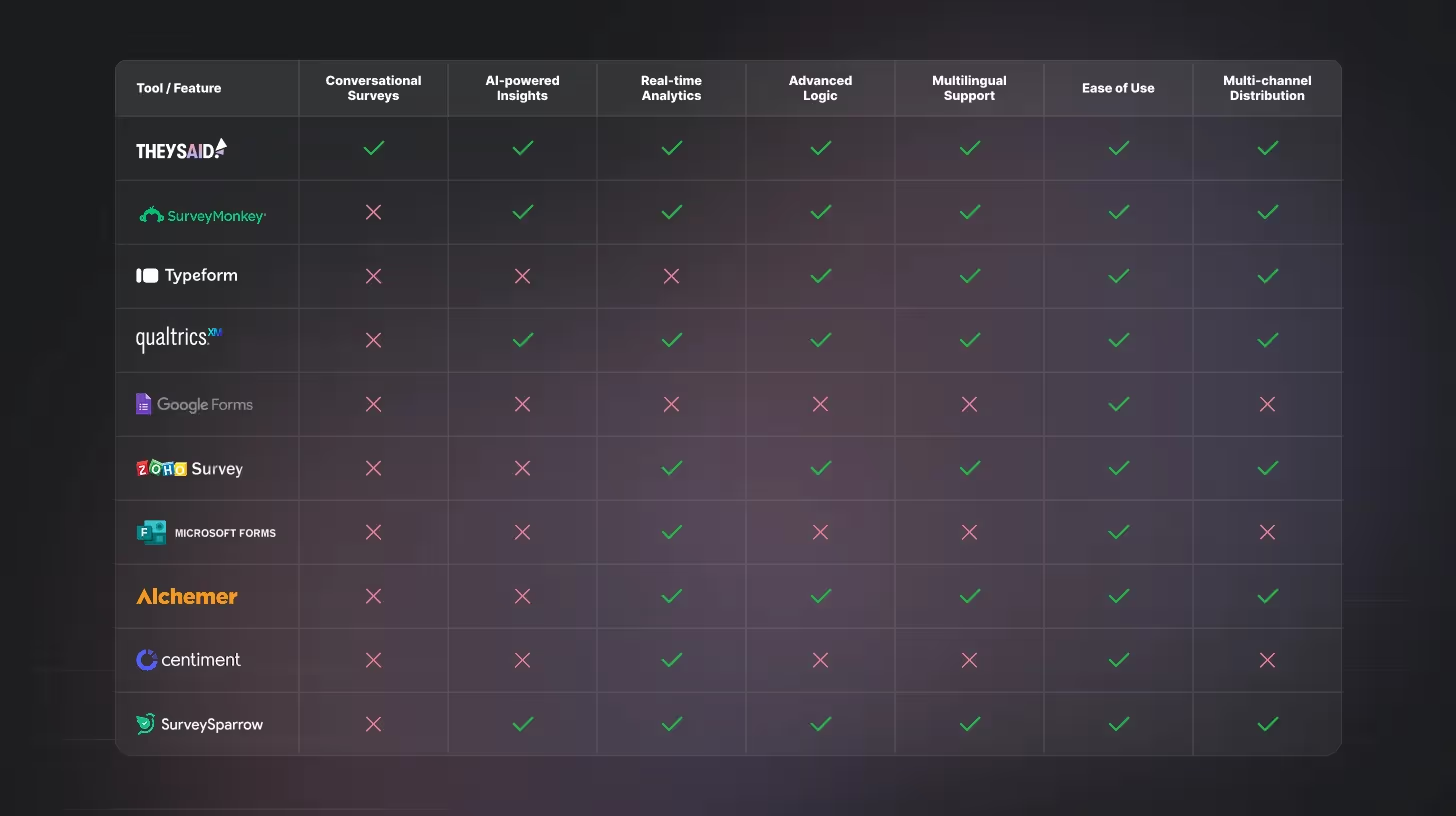
At the end of the day, most survey tools offer a mix of templates, analytics, and distribution options, but TheySaid clearly stands out. Unlike traditional form-based tools, TheySaid combines conversational AI, real-time insights, advanced logic, and affordability into one platform. For decision-makers who need faster, deeper, and more actionable feedback, TheySaid isn’t just another survey tool; it’s the modern choice for driving smarter strategies and better business outcomes.
Sign up for free and launch your first AI-powered survey in minutes.
FAQs
What is Survey Software?
Survey software is a digital tool that helps businesses, researchers, and organizations design, distribute, and analyze surveys. Instead of relying on paper forms or manual feedback collection, survey software makes it easy to gather data online through websites, email, mobile apps, and social media.
What is the best survey software in 2026?
The best survey software in 2026 is TheySaid. Unlike traditional tools that only collect responses, TheySaid uses conversational AI surveys, real-time analytics, and AI-powered insights to help businesses truly understand their audience. It’s built for modern decision-makers who need fast, actionable feedback to drive strategy, improve retention, and grow revenue.
Is TheySaid better than SurveyMonkey or Typeform?
Yes, in many ways. While SurveyMonkey and Typeform are popular, TheySaid offers conversational AI, real-time insights, and multilingual support features that make it more suitable for decision-makers in fast-moving businesses.
What features should I look for in a survey software?
The most important features include:
- Conversational interface
- AI-powered insights
- Advanced logic (branching, skip logic)
- Custom branding
- Multilingual support
- Real-time analytics
- Affordable pricing
Are free survey tools worth it?
Free tools like Google Forms or Microsoft Forms are useful for basic data collection but lack advanced features. If you need detailed insights, branding, or AI analysis, upgrading to platforms like TheySaid is worth the investment.
















.svg)